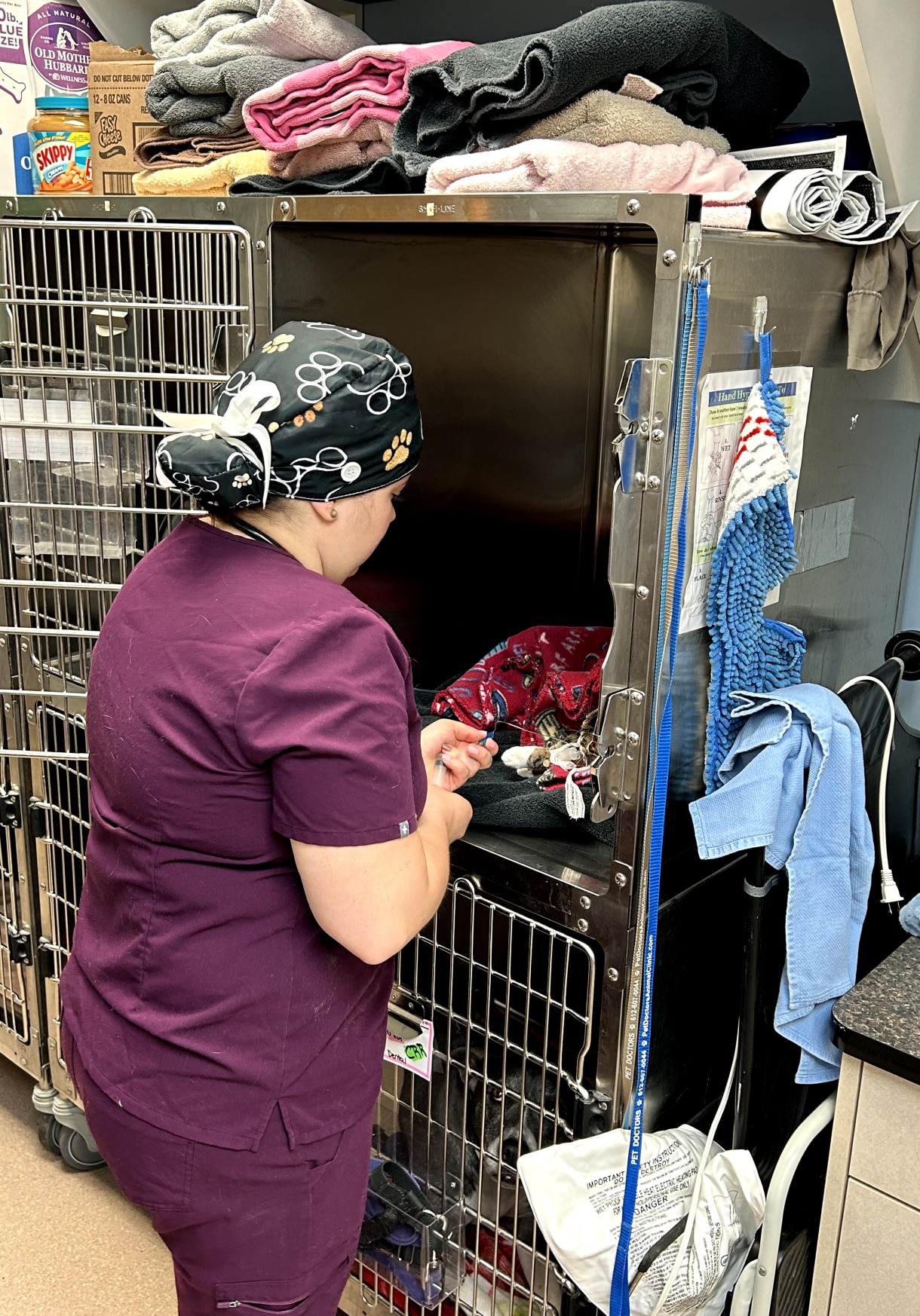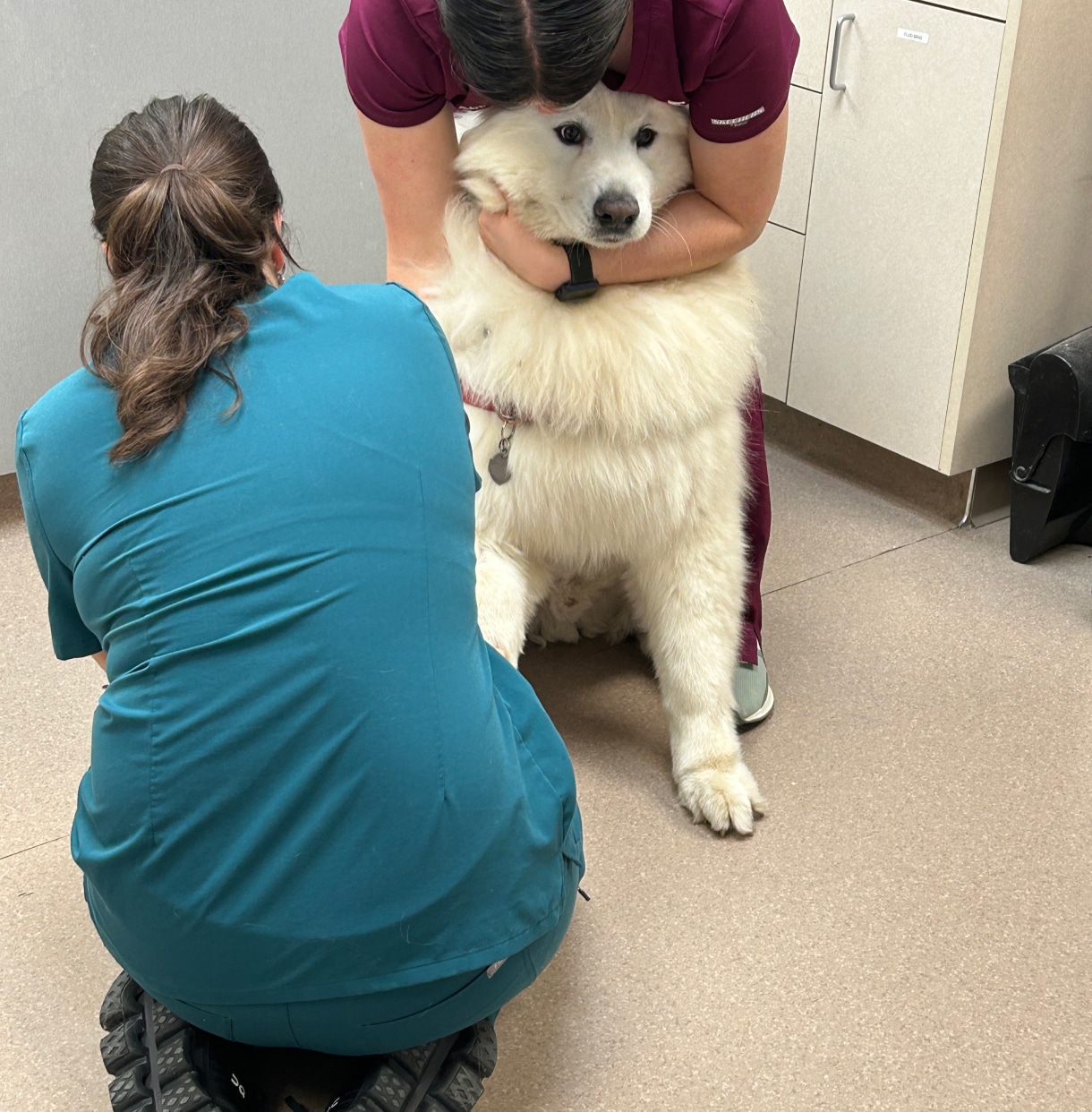Chronic Medical Conditions in Dogs and Cats
Chronic medical conditions can profoundly affect the lives of both pets and their owners. At Pet Doctors Animal Clinic in Minneapolis, our experienced veterinarians are dedicated to diagnosing, managing, and treating chronic health issues in dogs and cats. We are committed to providing compassionate, high-quality healthcare.
Common Chronic Conditions We Treat
Chronic medical conditions can significantly impact a pet’s overall well-being.
At Pet Doctors Animal Clinic, we provide specialized care for a variety of chronic conditions, including:
Diabetes
Diabetes mellitus is a common chronic condition that affects both dogs and cats. It is a lifelong condition that requires careful attention. This can lead to a range of health problems, including weight loss, increased thirst, frequent urination, and fatigue.
There are two main types of diabetes in pets:
- Type 1 DiabetesNo insulin production, requiring lifelong injections.
- Type 2 DiabetesThis form is more common in cats and is when the body can’t effectively use insulin. With proper management, some cats with Type 2 diabetes can achieve remission.
Diabetes is more commonly seen in middle-aged to older pets, especially those overweight. Early diagnosis and treatment are crucial to manage the condition and avoid complications such as cataracts, nerve damage, and organ failure. Managing diabetes in pets involves a combination of insulin therapy, diet, exercise, regular monitoring and owner education and support. Our team is here to guide you through.
Allergies
Just like humans, dogs and cats can suffer from allergies that cause discomfort and affect their overall health. While allergies are not life-threatening, they can significantly impact your pet’s quality of life if left untreated. Common symptoms of allergies in pets include itching, skin irritation, hair loss, ear infections, and digestive upset.
Managing allergic reactions and sensitivities through testing, medications, and dietary adjustments. Whether your pet suffers from environmental allergies, food sensitivities, or seasonal allergies, our experts provide comprehensive allergy management to minimize discomfort and prevent flare-ups.
Testing and Treatment Options
Diagnosing and managing allergies in pets requires a tailored approach. At Pet Doctors Animal Clinic, we offer several diagnostic tests and treatment options to help manage your pet’s allergies and improve their quality of life.
- Allergy TestingIntradermal Skin Testing and Blood Testing
- Elimination Diets for Food AllergiesFeeding your pet a limited-ingredient diet with a novel protein and carbohydrate source that they have not been exposed to before.
- MedicationsAntihistamines, Corticosteroids and Immunotherapy (allergy shots).
- Topical TreatmentsMedicated shampoos, sprays, and ointments.
- Environmental ManagementCreating a pet-friendly environment by reducing allergens.
- Long-Term ManagementMay involve a mix of medications, diet changes, environmental adjustments, and regular veterinary check-ups.
Kidney Disease
Chronic Kidney Disease (CKD) is a common condition, particularly in older pets, especially cats, and requires ongoing management to prevent further kidney damage and maintain a good quality of life. The kidneys are responsible for filtering waste from blood. When the kidneys begin to fail, toxins can build up in the body, leading to a range of health issues.
CKD often progresses slowly, so early detection and ongoing management are important. It can be caused by various factors like genetics, age, infections, exposure to toxins, or underlying health conditions such as high blood pressure or diabetes. Early signs of kidney disease can be subtle and may include:
- Increased thirst and urination
- Decreased appetite and weight loss
- Lethargy and weakness
- Vomiting or nausea
- Poor coat condition and dehydration
As the disease progresses, symptoms can become more severe, including oral ulcers, bad breath, and worsening lethargy. We offer a range of treatment options, including:
- Dietary Management
- Fluid Therapy
- Medications
- Regular Monitoring
Here’s how you can help manage chronic kidney disease at home:
- Follow the Recommended Diet
- Administer Medications and Fluids
- Monitor Your Pet’s Health
- Provide Comfort
Our team at Pet Doctors Animal Clinic is here to support you every step of the way, from diagnosis to ongoing care.
Cancer
Pets can develop various types of cancer that affect different parts of the body. In partnership with Minnehaha Animal Hospital, we offer the best diagnostic tools and treatment options available, including surgery and chemotherapy. Cancer is never easy. However, with a combination of advanced treatments and compassionate care, we strive to give your pet the best chance for a positive outcome.
The types of cancer that pets may develop are similar to those seen in humans, and include: Lymphoma, Mast Cell Tumors, Osteosarcoma, Hemangiosarcoma, Melanoma, Mammary Gland Tumors, and Oral Cancer. Cancer can develop in pets of any age, but older pets are more at risk. Some cancers have genetic and environmental factors. Early detection is vital in cancer treatment. Regular veterinary check-ups and monitoring of any unusual lumps, bumps, or changes in your pet’s behavior can help catch cancer early.
Diagnostic Tools for Cancer in Pets
At Pet Doctors Animal Clinic, we employ advanced diagnostic tools to accurately diagnose cancer in pets. Identifying the type, location, and stage of cancer is essential for determining the most appropriate treatment plan. Here are some of the diagnostic methods we may use:
- Physical Examination
- Biopsy and Fine Needle Aspiration (FNA)
- X-rays and Ultrasound
- Blood Tests
- CT Scans and MRI
- Histopathology
Treatment Options for Cancer in Pets
Cancer treatment in pets depends on the type, location, and stage of the disease, as well as your pet’s overall health. At Pet Doctors Animal Clinic, is to help manage cancer and improve your pet’s quality of life. In some cases, we may work in partnership with Minnehaha Animal Hospital or refer you to a veterinary oncologist for specialized care.
- Surgery
- Chemotherapy
- Radiation Therapy
- Immunotherapy
- Palliative Care and Pain Management
- Nutritional Support
Osteoarthritis and Degenerative Joint Disease
Osteoarthritis, also known as degenerative joint disease (DJD), is a common condition in aging pets, causing joint pain and stiffness. This worsens if left untreated. Joint disease can limit mobility and cause pain, especially in senior pets. Our goal is to help your pet stay active and pain-free for as long as possible through personalized pain management plans.
There are several types of joint diseases that can contribute to the development of arthritis, including:
- Osteoarthritis (OA)
- Elbow Dysplasia
- Hip Dysplasia
- Spinal Arthritis (Spondylosis)
Common signs of arthritis in pets can be subtle at first but tend to become more noticeable as the disease progresses:
- Stiffness, especially after rest
- Lameness or limping
- Difficulty rising, sitting, or lying down
- Reluctance to jump, climb stairs, or exercise
- Decreased activity level or interest in play
- Behavioral changes, such as irritability or restlessness
- Muscle atrophy (loss of muscle mass) around the affected joints
If you notice any of these signs in your pet, it’s important to schedule an evaluation at Pet Doctors Animal Clinic. Early intervention can manage symptoms and slow the progression of the disease, improving your pet’s overall health.
Here are some of the pain management and treatment strategies we offer:
- MedicationsNon-Steroidal Anti-Inflammatory Drugs (NSAIDs), pain relievers, Corticosteroids and Disease-Modifying Osteoarthritis Drugs (DMOADs).
- Joint SupplementsGlucosamine and Chondroitin, Omega-3 Fatty Acids and Hyaluronic Acid
- Weight Management
- Exercise and Physical Therapy
- Laser Therapy
- Acupuncture
- Assistive Devices
- Environmental Modifications
Your pet’s comfort and mobility are our top priorities. At Pet Doctors Animal Clinic, we work closely with you to monitor your pet’s condition and adjust their treatment plan as needed.
Cushing’s Disease
Cushing’s disease, also known as hyperadrenocorticism, is an adrenal gland disorder causing excessive cortisol production. It is most commonly diagnosed in middle-aged to older dogs, but can also affect cats. Diagnosing and managing this hormonal disorder to reduce symptoms and improve your pet’s quality of life. Cushing’s disease requires careful management of hormone levels to alleviate symptoms such as excessive thirst, weight gain, and skin changes.
Cushing’s disease can be caused by one of three main factors:
- Pituitary-Dependent Cushing’s Disease (PDH)
- Adrenal-Dependent Cushing’s Disease (ADH)
- Iatrogenic Cushing’s Disease
Cushing’s disease develops gradually, and has subtle early symptoms, making it challenging to diagnose early. Common signs of Cushing’s disease in pets include: increased thirst, hunger, urination, weight gain, thin skin, hair loss, weakness, panting, infections, behavior changes. If left untreated, Cushing’s disease can lead to serious complications, including diabetes, high blood pressure, kidney infections, and an increased risk of blood clots.
At Pet Doctors Animal Clinic, our goal is to manage your pet’s symptoms effectively and tailor a treatment plan that addresses their specific needs.
- MedicationsTrilostane (Vetoryl®) and Mitotane (Lysodren®)
- Surgery
- Management of Iatrogenic Cushing’s Disease
- Regular Monitoring
- Diet and Lifestyle Adjustments
Our veterinarians and staff take the extra steps necessary to understand your pet’s unique needs, lifestyle, and health concerns. With every visit, our goal is to make your pet feel comfortable and cared for while ensuring that you have all the information needed to manage their health at home.
Pet Doctors Animal Clinic: Friendly Service, Outstanding Results
At Pet Doctors Animal Clinic, we’re not just about treating symptoms; we’re about improving your pet’s quality of life. Chronic conditions require consistent management and compassionate care, and that’s exactly what we offer. Here’s why pet owners in Minneapolis trust us:

Time to Take Action on Your Pet's Chronic Condition | Schedule an Appointment Today!
If your pet has been diagnosed with a chronic condition or if you suspect that they might be showing symptoms of one, contact Pet Doctors Animal Clinic in Minneapolis at (612) 607-0044 today. Our compassionate and knowledgeable team is here to help. Together, we can create a plan to manage your pet’s health and improve their quality of life.
Frequently Asked Questions About Chronic Medical Conditions in Pets
How do I know if my pet has a chronic medical condition?
Common signs include persistent symptoms such as excessive thirst, changes in appetite, weight loss, fatigue, and chronic pain. If your pet is displaying any of these signs, it’s important to schedule a veterinary check-up.
Can chronic conditions be cured?
Most chronic conditions cannot be cured but can be managed with proper treatment. Our goal is to improve your pet’s quality of life through medications, lifestyle changes, and ongoing care.
How often should a pet with a chronic condition see the vet?
Pets with chronic conditions should have regular check-ups, typically every 3-6 months, depending on the condition. These visits help us monitor their health and adjust treatment plans as needed.
What can I do to help manage my pet’s condition at home?
Follow your veterinarian’s recommendations regarding diet, exercise, and medications. Keeping a close eye on your pet’s symptoms and reporting any changes can also help in managing their condition.
Are chronic conditions more common in older pets?
Yes, chronic conditions are often more prevalent in senior pets. Regular wellness exams are crucial to catch any potential health issues early, ensuring your pet gets the best care possible.
For more information, or to discuss your pet’s specific needs, please call us at (612) 607-0044 or visit us at Pet Doctors Animal Clinic in Minneapolis.
